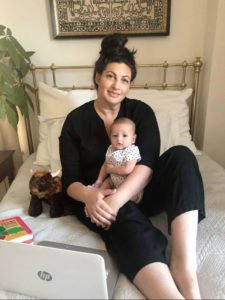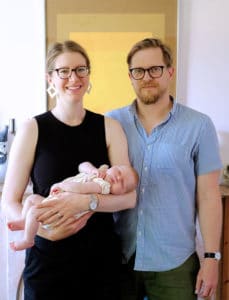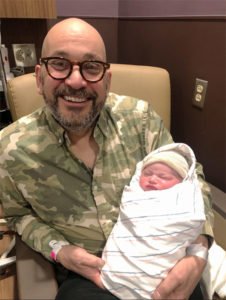First-time moms dealing with birth and pregnancy share their concerns, fears and hopes
By Jana Eisenberg

Just like in “normal times,” people’s experiences of pregnancy and birth during a pandemic depend on their circumstances, disposition and beliefs.
At a time that is generally joyful — and often filled with family and celebration — extra challenges, including physical, emotional and mental health, loom large.
“While there are currently no data showing that COVID-19 affects pregnant people differently than others, we know that pregnant people are at greater risk of getting sick from other respiratory viruses than people who are not pregnant,” states the CDC on its website.
Especially for those having a baby for the first time, there can be a lot of questions and concerns, from what products to use, to fearing their child missing out on socialization.
“COVID changed all of our plans”
Take Vanessa Fineberg, 34, who gave birth to Vincent Valentine on March 24 at Sisters Hospital in Buffalo. She is an admissions screener for Elderwood, a company that runs senior facilities with a range of living and therapeutic options; her partner, John Marfoglia, 58, owns an antique store in Buffalo. They had recently moved into a Buffalo apartment, and were living there when the shutdown came.
“COVID changed all of our plans,” she said by phone recently. “I’ve always struggled with anxiety, and I knew that I would be a poster child for post-partum depression. We had arranged for a post-partum doula to stay with us. Of course, we were not able to do that. I was also physically sick after the birth; I would have stayed in the hospital longer if it wasn’t for COVID.”
Because she wasn’t well, Fineberg couldn’t help her partner care for their newborn; her mother stayed with them for a while — after first quarantining. Fineberg has been doing Facetime and Skype sessions with both the doula and a doctor-recommended therapist. She and Marfoglia both worried about the virus, and, with the extra challenges of navigating life in a large apartment building, possible transmission to the baby.

She is feeling better, and will be working from home, “with a baby in her lap,” she said.
Aunt would have come from Los Angeles
Then there’s Emma Montague, 29, who gave birth to Veronica Valentina on May 3. A therapist who works at a community mental health agency, Montague had been working from home since mid-March, meeting with clients via phone and video. Before she gave birth, she quarantined because of COVID, her pregnancy and a compromised auto-immune system. She and her husband, artist Julian Montague, 47, had moved into a house in Buffalo’s Allentown district in December.
Emma had heard growing fears about the spread of the disease, and the threats especially in hospitals; she accepted that she might have to give birth at the hospital alone. Luckily for her and her husband, that didn’t happen.
“In many ways, we were incredibly lucky,” she said in a recent phone interview. “I’m younger, and I didn’t have a high-risk pregnancy. Our infant sleeps 16–20 hours a day, that’s very lucky. I was worried that we wouldn’t have help if we needed it, like if I’d had any complications.
“It was very upsetting from the perspective of family. Julian’s parents are in their 70s; I was sad and felt bad that they couldn’t meet the baby right away,” she added. “And my aunt, who I am very close with, would have come from Los Angeles.”
A change from an OB-GYN to a midwife

Jennifer Sansano, 27, never stopped working at a holistic health and wellness center, which was deemed essential; she’s a receptionist. Due to give birth in mid-August, she and her boyfriend, Marcellus Eccles, 28, who owns a technology business, live in their own home in Tonawanda. After discussing the birth environment they wanted, Sansano had switched her care from a traditional OB-GYN to a midwife, coronavirus notwithstanding. That was in early April.
Sansano is not as concerned about the virus itself, but rather uncertain about and occasionally frustrated by the situation. “It’s strange to think about giving birth during this time; I wonder if I will still get the same prenatal care treatment, how will my appointments be…and what it will it be like bringing a child into this environment,” she said.
“I have had one prenatal care appointment by phone,” continued Sansano. “When I went to the hospital for the anatomy scan, my boyfriend was not allowed to come with me. We’d planned to find out the gender together. I feel like we’re missing out on a lot. I’d envisioned this experience in a different way.”
Fineberg agrees that managing expectations can be difficult.
“My therapist has helped shape my attitude, to stay as positive as possible,” she said. “COVID didn’t ruin this experience for me, it changed it.”
Montague and her husband, who already worked from home pre-pandemic, are viewing the shift to her working at home as well as an “opportunity to do childcare for themselves,” said Julian.
Caring for the newborn

Pediatricians are continuing regular infant care with some extra safety precautions, said both couples who’ve had their babies already. This also follows CDC guidelines.
“We have to go in for every appointment; Delaware Pediatrics is wonderful. Monitoring his growth and staying with the vaccination schedule are important,” said Fineberg. “They schedule ‘well visits’ before 1 p.m., and sick kids after 1. Only one of us can go in; we feel safe about it, they are wearing masks, gloves and sanitizing like crazy.”
The Montagues selected Allentown Pediatrics, though, said Emma, they weren’t able to conduct a traditional pre-birth interview to see if the practice was a good fit. “It’s two blocks from our house,” she noted. “Only one parent at a time is allowed in. I went the first time, a few days after giving birth, and then Julian went for the two-week visit.”
Another area that presented challenges was the “trial-and-error” aspect of having and dealing with a baby and all its needs.
“In a COVID world, you can’t just browse at a store and get something else that might work, for example diaper rash cream,” said Fineberg. “Also shopping like that can be an opportunity to shut your mind off, grab that 20-minute break. Living in an apartment building during COVID, especially with a newborn, is nerve-wracking.” The family is moving to a house nearer to Fineberg’s mother in the suburbs.
Sansano has a similar reaction. “Since stores have been closed or online only, there have been some products I’ve wanted to physically touch and ask questions about,” she said. “That’s been really hard, just basing decisions on online reviews.”
Socialization is another concern for all of the families, whether for themselves or their babies.
“So far, Vanessa’s mother has been the only other person to hold him,” said Marfoglia, Fineberg’s partner. “We want to be able to socialize him with adults and other babies, but we haven’t so far.”
With an outdoor space at their house, the Montagues are able to enjoy visits from family and friends at a distance.
Sansano adds that she doesn’t think things will be too different in a post-COVID-19 world, though she did cancel the non-traditional, all-gender “baby-cue” shower she’d planned, partly due to concerns over people’s comfort level with large gatherings.
She ended up holding her shower “by mail.” “I think of everyone traditionally celebrating together during pregnancy in general; my family has been quarantining themselves,” she said. “I haven’t seen my sisters as much as I normally would, they are missing out on the experience with me.”

